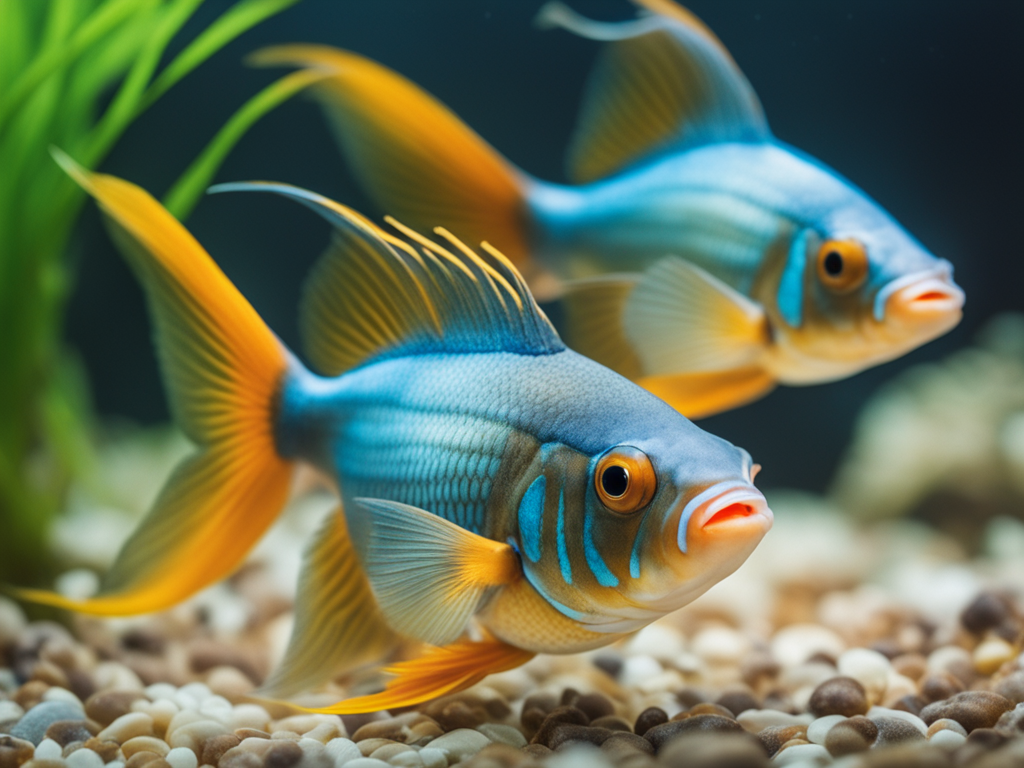Aquatic Ailments: Pet Fish Health Problems

Pet fish health problems: With a growing number of households adding fish to their families, it’s crucial to understand the common ailments that can affect these aquatic creatures. In this blog post, we’ll explore various diseases and issues that can impact the well-being of your finned friends. By identifying early signs of trouble and taking appropriate measures, you’ll be able to ensure your fish live a healthy, happy life in their underwater home. So, let’s get started on this deep-sea journey to better understand pet fish health problems and how to address them effectively.
Physical Ailments
If you’re a pet fish owner, you may have noticed your fish displaying unusual behaviors or physical symptoms. These symptoms could be indications of physical ailments that require your attention. Below are the common physical ailments that may affect your pet fish.
Swim Bladder Disorder
Swim bladder disorder is a common ailment that affects many pet fish species. This disorder occurs when the swim bladder, which helps fish control their buoyancy, becomes inflamed or infected. Symptoms of swim bladder disorder include difficulty swimming, floating to one side, or sinking to the bottom of the tank.
Fungal Infections
Fungal infections are caused by fungi that grow on fish scales, fins, and tails. This type of infection often occurs when the fish’s immune system is weakened by poor water quality or stress. Symptoms of fungal infections include white or gray patches on the fish’s body, frayed fins, and lethargy.
Bacterial Infections
Bacterial infections are caused by harmful bacteria that can affect different parts of the fish’s body. These infections can be difficult to diagnose because the symptoms may vary depending on the type of bacteria. Some common symptoms of bacterial infections include redness, swelling, and open sores on the fish’s body.
Parasites
Parasites are common in pet fish and can cause a wide range of symptoms. These tiny organisms can affect the fish’s internal organs, causing damage and disease. Symptoms of parasitic infections include scratching against objects, rapid breathing, and loss of appetite.
——————————-
Get access to the best pet discounts, items, and training by clicking the link below
————————————-
Environmental Ailments
Pet fish are delicate creatures that require a specific environment to thrive. Environmental ailments are health problems that arise when a fish’s living conditions are not suitable for its needs. These ailments can be prevented by providing the proper care and maintenance for your aquarium. Here are some common environmental ailments that pet fish can experience:
1. Temperature Shock
Temperature shock occurs when there is a sudden change in water temperature. This can happen when adding new fish to the aquarium or when changing the water. Fish are sensitive to temperature changes and can quickly become stressed or even die if the temperature changes too rapidly. To prevent temperature shock, it’s essential to acclimate the new fish slowly to the aquarium’s temperature. Also, when changing the water, make sure the new water is at the same temperature as the old water.
2. Poor Water Quality
Poor water quality can lead to several health problems for pet fish. Fish produce waste, and if the tank is not cleaned regularly, the waste can accumulate and release toxins into the water. This can lead to ammonia and nitrite poisoning, which can be fatal to fish. To maintain good water quality, it’s essential to perform regular water changes and clean the tank’s filter.
3. Overcrowding
Overcrowding is another common environmental ailment that pet fish can experience. When too many fish are in one aquarium, the water quality can quickly deteriorate, and the fish can become stressed. Overcrowding can also lead to aggressive behavior and territorial disputes among fish. To prevent overcrowding, it’s essential to research the type of fish you plan to keep and their space requirements.
4. Lack of Oxygen
Fish need oxygen to survive, and if the aquarium’s water is not adequately oxygenated, the fish can become stressed or even die. Lack of oxygen can occur when there are too many plants or decorations in the aquarium, or the filter is not working correctly. To prevent oxygen deprivation, it’s essential to ensure proper water circulation and avoid overcrowding the aquarium.
5. Improper pH Levels
Fish are sensitive to changes in pH levels, and if the pH is too high or too low, it can lead to health problems. Different types of fish require different pH levels, so it’s essential to research the specific needs of the fish you plan to keep. To maintain proper pH levels, it’s essential to test the water regularly and make necessary adjustments.
Maintaining a healthy environment for your pet fish is crucial to their well-being. By understanding and preventing environmental ailments, you can ensure your fish live a happy and healthy life.
Parasitic Ailments
Parasites are common in pet fish, causing a range of health problems. Understanding the various types of parasites and their symptoms is crucial to ensuring your fish remains healthy. Here are some common parasitic ailments your pet fish may encounter:
Ichthyophthirius Multifiliis
Ichthyophthirius Multifiliis, commonly known as “ich” or “white spot disease,” is a common parasitic ailment that affects freshwater fish. It is caused by a single-celled parasite that attaches itself to the fish’s skin, fins, and gills. Symptoms include small white spots on the fish’s body, clamped fins, and rubbing against objects in the aquarium.
Costia
Costia is a small parasitic protozoan that can infect both freshwater and saltwater fish. It can cause skin and gill irritation, leading to lethargy, loss of appetite, and rapid breathing. Fish infected with Costia may also develop a thick mucus layer on their skin.
Flukes
Flukes are flatworm parasites that attach themselves to the gills and skin of fish. They can cause respiratory problems, lethargy, and loss of appetite. Infected fish may also develop skin irritation, redness, and excess mucus production.
Anchor Worms
Anchor worms are parasitic crustaceans that burrow into the skin of fish, causing irritation and inflammation. They appear as small white or green threads protruding from the fish’s body. Infected fish may rub against objects in the aquarium and develop secondary infections.
Treatment
Treatment for parasitic ailments varies depending on the type of parasite and the severity of the infection. Over-the-counter medications are available for most parasitic infections, including ich, flukes, and Costia. For severe infections, it may be necessary to consult a veterinarian who specializes in fish health.
Prevention is key to avoiding parasitic ailments. Maintaining a clean and well-filtered aquarium, avoiding overfeeding, and quarantining new fish before introducing them to the aquarium can all help prevent parasitic infections. By staying vigilant and taking preventative measures, you can keep your pet fish healthy and happy.
——————————-
Get access to the best pet discounts, items, and training by clicking the link below
————————————-
Aquatic Ailments: Pet Fish Health Problems
In this article, we’ll take a closer look at bacterial ailments that can affect pet fish. Bacteria are microorganisms that can cause diseases in fish. Most bacterial infections can be treated with antibiotics, but prevention is always better than cure. Here are some common bacterial ailments that your pet fish may encounter:
Fin Rot
Fin rot is a bacterial infection that affects the fins and tail of fish. The infected fins will become ragged and discolored. In severe cases, the fins may fall off completely. Fin rot can be caused by poor water quality, injury, or stress. To prevent fin rot, make sure your aquarium is clean and well-maintained. If you notice any signs of fin rot, you should isolate the infected fish and treat it with an antibiotic.
Columnaris
Columnaris is a bacterial infection that affects the skin and gills of fish. Infected fish will have white patches on their body, and their gills may become discolored. Columnaris can be caused by poor water quality, injury, or stress. To prevent columnaris, make sure your aquarium is clean and well-maintained. If you notice any signs of columnaris, you should isolate the infected fish and treat it with an antibiotic.
Mouth Rot
Mouth rot is a bacterial infection that affects the mouth and lips of fish. Infected fish will have swollen and discolored lips, and their mouth may become ulcerated. Mouth rot can be caused by poor water quality, injury, or stress. To prevent mouth rot, make sure your aquarium is clean and well-maintained. If you notice any signs of mouth rot, you should isolate the infected fish and treat it with an antibiotic.
Ulcers
Ulcers are open sores that can develop on the skin of fish. They are often caused by a bacterial infection. Infected fish will have open wounds on their body that may become infected with other bacteria. Ulcers can be caused by poor water quality, injury, or stress. To prevent ulcers, make sure your aquarium is clean and well-maintained. If you notice any signs of ulcers, you should isolate the infected fish and treat it with an antibiotic.
Remember, prevention is always better than cure. Make sure your aquarium is clean and well-maintained, and keep an eye out for any signs of bacterial infections. If you notice any signs of illness in your pet fish, act quickly to isolate and treat the infected fish.
Treatment and Prevention of Aquatic Ailments
Aquatic ailments can be a headache for pet owners. Early diagnosis, treatment, and prevention can go a long way in keeping your pet fish happy and healthy. This section will explore the various treatment options available and how to prevent any future problems from arising.
Treatment Options
There are several treatment options available for aquatic ailments, including medication, water changes, and quarantine. In cases of bacterial infections, antibiotics like erythromycin or tetracycline can be added to the water. Parasitic infections can be treated with medications like copper or formalin. Water changes can help reduce the severity of the infection by removing the harmful agents from the water. In some cases, it may be necessary to quarantine infected fish to prevent the spread of the illness to other fish in the aquarium.
Prevention Methods
Prevention is always better than cure, and this is true for pet fish as well. Here are some ways to prevent aquatic ailments from occurring:
- Proper tank maintenance: Regular water changes, cleaning of the tank, and maintenance of the filter can help prevent infections from occurring.
- Quarantine new fish: New fish should be quarantined for at least two weeks to ensure that they are healthy and do not carry any diseases.
- Feed a balanced diet: A balanced diet with enough vitamins and minerals can help keep the immune system of your fish healthy.
- Monitor the water temperature: Water temperature fluctuations can be stressful for fish and can lead to illness.
- Don’t overstock your tank: Overcrowding can lead to poor water quality, which can cause illnesses.
——————————-
Get access to the best pet discounts, items, and training by clicking the link below
————————————-
Conclusion
In conclusion, it’s important to understand that fish, just like any other pets, are susceptible to various health issues. By knowing the symptoms of common aquatic ailments and taking preventative measures, you can ensure that your pet fish stays healthy and happy. Regularly checking the water quality, providing a balanced diet, and keeping the tank clean will go a long way in preventing most health problems. However, if you do notice any signs of illness, it’s important to act quickly and seek the advice of a veterinarian who specializes in aquatic animals.
Remember, prevention is always better than cure, so take good care of your pet fish, and they will reward you with their beauty and companionship for years to come.
Pet Fish Health Problems FAQ:
As pet fish owners, it is important to be aware of the potential health problems that your aquatic companions may face. Here are some of the most frequently asked questions about aquatic ailments:
What are some common health problems that fish may experience?
Just like any other pet, fish can experience a range of health problems. Some of the most common ailments that fish may experience include swim bladder disease, fin rot, ich, and dropsy. It is important to be able to recognize the signs of these ailments so that you can seek treatment as soon as possible.
How can I prevent my fish from becoming sick?
Prevention is key when it comes to keeping your fish healthy. Make sure to keep their tank clean and well-maintained, feed them a balanced diet, and avoid overcrowding the tank. Additionally, it is important to quarantine any new fish before adding them to a tank with other fish to prevent the spread of disease.
What should I do if I notice that my fish is sick?
If you notice that your fish is showing signs of illness, such as lethargy, loss of appetite, or abnormal behavior, it is important to take action immediately. Start by testing the water quality and making any necessary adjustments. You may also need to treat your fish with medication or seek the advice of a veterinarian who specializes in aquatic animals.
Can fish diseases be passed on to humans?
While it is rare, some fish diseases can be passed on to humans. These diseases are typically contracted through direct contact with the fish or their environment. It is important to practice good hygiene when handling your fish and to always wash your hands thoroughly after cleaning their tank or handling any equipment.
By being proactive and taking steps to prevent and treat aquatic ailments, you can help to ensure that your fish live long and healthy lives.








